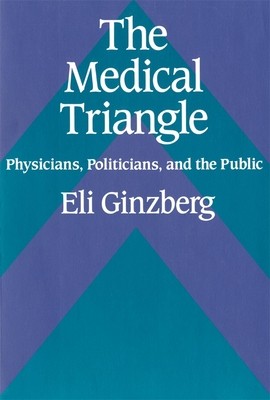
- We will send in 10–14 business days.
- Author: Eli Ginzberg
- Publisher: Harvard University Press
- ISBN-10: 0674563263
- ISBN-13: 9780674563261
- Format: 15.6 x 23.4 x 2.2 cm, softcover
- Language: English
- SAVE -10% with code: EXTRA
Reviews
Description
Runaway medical costs, long-term care, market competition, for-profit medicine, nursing shortages--these are but a few of the issues that swirl around in the late twentieth century's volatile health care scene. How much of the system do we want to change, and how much do we want to keep? Health policy expert Eli Ginzberg examines such crucial questions in his characteristically broad-gauged perspective. Framing the issues in their historical, political, and professional contexts, the author analyzes how we have arrived at the current crisis.
The book focuses on the three sides of the medical triangle that have separate and sometimes conflicting goals: the physicians want to provide the most health care for the most money; the government, which furnishes 40 percent of the system's funding, wants to limit the money it pays out for health care; and the public, with over a billion annual visits to doctors, wants the most health care for the least money. Ginzberg explains how the core components of our health care system--the community hospital and physicians who have long practiced in a fee-for-service mode--are under attack, and he indicates the factors that make it uncertain whether the destabilization will slow down or accelerate. Moreover, can key health care centers maintain their leadership in a time when new dollars for health are scarce? How will the floundering state of foundations affect medical care in local communities? In his final chapters the author zeroes in on the special concerns of the public: high-need patients (including those suffering from cancer, catastrophic illness, and the infirmities of old age, or those who are mentally ill or chronically poor), nursing shortages, unsuccessful cost containment, and lack of consensus within the medical triangle about the major issues on our nation's health agenda.EXTRA 10 % discount with code: EXTRA
The promotion ends in 16d.21:00:27
The discount code is valid when purchasing from 10 €. Discounts do not stack.
- Author: Eli Ginzberg
- Publisher: Harvard University Press
- ISBN-10: 0674563263
- ISBN-13: 9780674563261
- Format: 15.6 x 23.4 x 2.2 cm, softcover
- Language: English English
Runaway medical costs, long-term care, market competition, for-profit medicine, nursing shortages--these are but a few of the issues that swirl around in the late twentieth century's volatile health care scene. How much of the system do we want to change, and how much do we want to keep? Health policy expert Eli Ginzberg examines such crucial questions in his characteristically broad-gauged perspective. Framing the issues in their historical, political, and professional contexts, the author analyzes how we have arrived at the current crisis.
The book focuses on the three sides of the medical triangle that have separate and sometimes conflicting goals: the physicians want to provide the most health care for the most money; the government, which furnishes 40 percent of the system's funding, wants to limit the money it pays out for health care; and the public, with over a billion annual visits to doctors, wants the most health care for the least money. Ginzberg explains how the core components of our health care system--the community hospital and physicians who have long practiced in a fee-for-service mode--are under attack, and he indicates the factors that make it uncertain whether the destabilization will slow down or accelerate. Moreover, can key health care centers maintain their leadership in a time when new dollars for health are scarce? How will the floundering state of foundations affect medical care in local communities? In his final chapters the author zeroes in on the special concerns of the public: high-need patients (including those suffering from cancer, catastrophic illness, and the infirmities of old age, or those who are mentally ill or chronically poor), nursing shortages, unsuccessful cost containment, and lack of consensus within the medical triangle about the major issues on our nation's health agenda.

Reviews